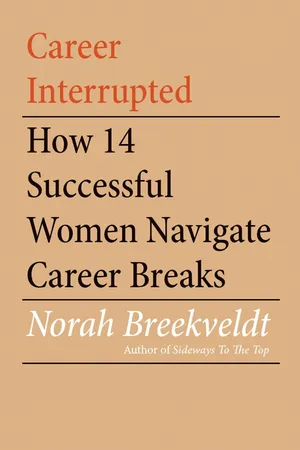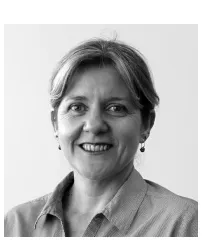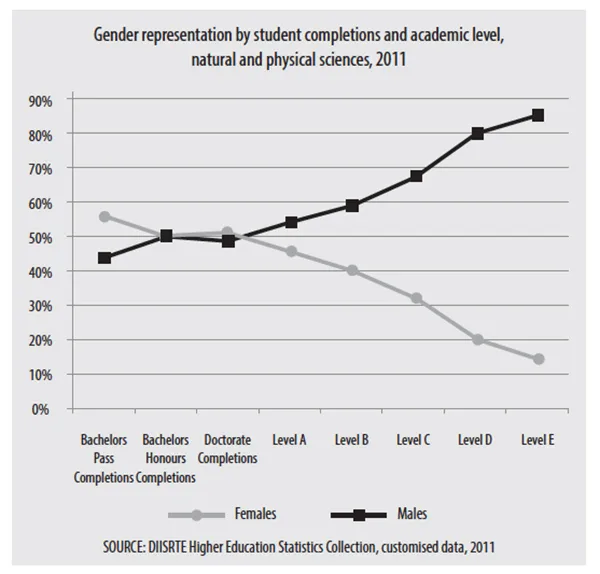
- 232 pages
- English
- ePUB (mobile friendly)
- Available on iOS & Android
About this book
How do women defy the odds and get their careers back on track after a break? How do women manage the mummy mafia at the school gate? Is there a motherhood penalty? Can women really have it all - a successful career and a rewarding family life? Does overseas experience really accelerate your career in Australia? How do you recreate your career after a setback? In Career Interrupted fourteen high-achieving women talk openly about their challenges in carving out a successful career after a break. These women come from all walks of life - from battlers to privileged backgrounds, from small business to big corporations, from large corporates to small business, from professional services to the community sector. Several women had children and talk candidly about what it's like to be in the throes of mother guilt and come out the other side; some are expatriates who returned to Australia to rebuild their career, yet others had to re-establish their career after a misstep. These stories are interwoven with the latest research from thought leaders around the obstacles and pitfalls in leaving the workforce for a time, and include practical and proven strategies to overcome these hurdles. Career Interrupted contributes to the discussion and debate in business and the broader community about how to develop workplaces where the contribution of everyone, including women, is recognised, nurtured and optimised. It explores the shared experiences of women who have had to navigate a break in their career and provides a beacon for other women about to embark on a similar journey. Her Excellency Frances Adamson, Australian Ambassador to the People's Republic of China;
Anna Burke, Federal member for Chisolm;
Lisa Croxford, Capability Development Manager, Herbert Smith Freehills;
Lucinda Dunn OAM, Artistic Director, Tanya Pearson Classical Coaching Academy;
Dr Marguerite Evans-Galea, Scientist, Bruce Lefroy Centre, Murdoch Children's Research Institute;
Jennifer Keyte, Seven News Melbourne Weekend News Presenter;
Dr Sharon Lierse, Lecturer, Charles Darwin University;
Samone McCurdy, PhD candidate and Program Consultant, Monash University;
Lucinda Nolan, Deputy Police Commissioner, Victoria Police;
Kelly O'Dwyer, Federal Member of Parliament for Higgins and Parliamentary Secretary to the Treasurer;
Dr Hannah Piterman, Consultant, advisor and author, co-founder of Gender Worx;
Moira Rayner, Lawyer and former WA Anti-corruption Commissioner;
Lucy Roland, Marketing specialist and Communications Coach;
Jodie Sizer, Principal, PwC Indigenous Consulting;
Tracey Spicer, Journalist and newsreader;
Dr Helen Szoke, Chief Executive, Oxfam Australia;
Dr Jennifer Whelan, Director, Psynapse Psychometrics and Research Fellow, Melbourne Business School. 'These stories offer inspiration and give insight into how success was achieved by many women despite the ongoing barriers to equality. They provide plenty of ideas for anyone wishing to have a career break, for any reason.' - Kate Jenkins, Victorian Equal Opportunity and Human Rights Commissioner
Frequently asked questions
- Essential is ideal for learners and professionals who enjoy exploring a wide range of subjects. Access the Essential Library with 800,000+ trusted titles and best-sellers across business, personal growth, and the humanities. Includes unlimited reading time and Standard Read Aloud voice.
- Complete: Perfect for advanced learners and researchers needing full, unrestricted access. Unlock 1.4M+ books across hundreds of subjects, including academic and specialized titles. The Complete Plan also includes advanced features like Premium Read Aloud and Research Assistant.
Please note we cannot support devices running on iOS 13 and Android 7 or earlier. Learn more about using the app.
Information


Table of contents
- Preface
- Introduction
- Moira Rayner
- Her Excellency Frances Adamson
- Dr Helen Szoke
- Dr Marguerite Evans-Galea
- Anna Burke and Kelly O’Dwyer
- Lucinda Nolan
- Lisa Croxford
- Jodie Sizer
- Tracey Spicer
- Jennifer Keyte
- Lucinda Dunn, OAM
- Dr Sharon Lierse
- Lucy Roland
- Dr Hannah Piterman
- Dr Jennifer Whelan
- Samone McCurdy
- Conclusions
- Comebacks
- Additional Reading
- Acknowledgements